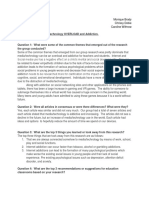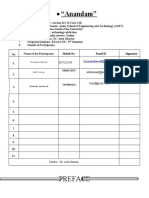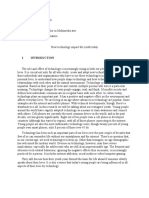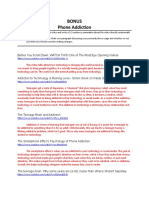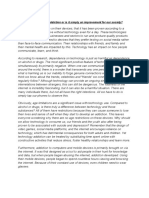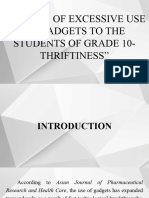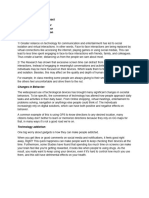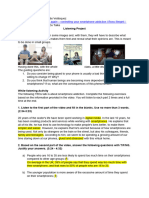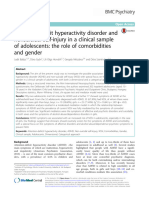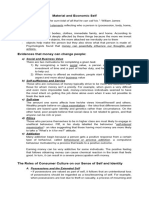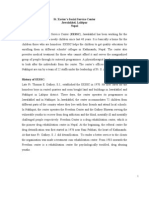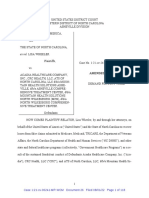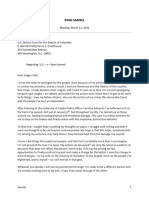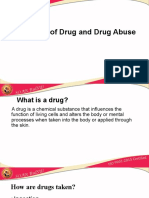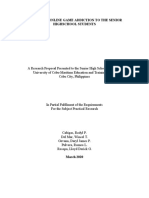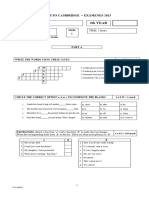“Technology Addiction”
Gharbiya STEM High School
English Department
March 2023
Team Members: Emails
▪ Eman Mahmoud Eldaba eman.1920503@stemgharbiya.moe.edu.eg
▪ Habiba Ahmed Elhelw habiba.1920505@stemgharbiya.moe.edu.eg
▪ Habiba Ahmed Elmayet habiba.1920506@stemgharbiya.moe.edu.eg
▪ Sara Mohamed Mohamed sara.1920516@stemgharbiya.moe.edu.eg
Under Supervision/ Date of submission
Mr. Hassan Adel Tuesday 21/3/2023
0|Page
� Table of Contents
1. Executive Summary 2
2. Introduction 3-4
a) The problem 3
b) The hypothesis 4
3. Body 4-12
a) Methodology 4-5
b) Findings 5-12
4. Conclusion 13
a) Summary of findings 13
b) Recommendations 13
5. Appendix 14-16
a) References 14
b) The Questionnaire 14-16
1|Page
� “Mother: Go get me some groceries from the supermarket.
Son, playing with his phone: Okay just a minute, mum.
After 5 minutes
Mother: Did you do what I asked of you?
Son: Oh mum, just a few minutes, please.
Mother: Again?! you are procrastinating, even your food has not been eaten yet.”
The same problem repeated with different Scenarios in our life.
1. Executive summary
Technology addiction (also called Internet addiction, or Internet use disorder( is a
broad term used to describe any obsessive tech-related behavior, be that gaming,
online shopping, social media use, video watching, or anything else involving
digital technology. More than likely, when we say “tech addiction” or “digital
addiction,” we’re really talking about teenagers’ inability to live without a favorite
game or their phone and the negative behaviors that can come with that. we
demonstrated a survey with 8 questions. Some questions to determine what content
a person spends their time on and how much time they spend browsing with their
phone to define their engagement Rate with technology. Some questions also
measure the impact of technology on the individual’s relationship with society and
friends around them while others ask about procrastination, ending with an open-
ended question to provide their opinions about the Causes of technology
addictions, we consider this to be the most important plan on the way to reaching
a solution. After analyzing the responses, we found that most people, especially
teenagers, spend their time on useless content whether because of fear of missing
out, escaping from responsibility, or even having free time. In Addition, most
people who have this type of addiction don’t think about the out possibility of
being tech-addicted at all. Finally, after studying the problem and its reasons, we
established some recommendations about dealing with technology addiction and
how to reassure the victim.
2|Page
� 2. Introduction
The Technology Addiction Team works across disciplines and engages with
stakeholders to contribute to a greater conceptual understanding of how and why
people make decisions about technology use that impact mental health and may
lead to behavioral addictions (e.g., online gambling and gaming). Given the
dynamic nature of emerging technologies, many mental health impacts are not well
understood. Our team has expertise from a range of disciplines to consider the wide
implications of technology on addictive behaviors, including understanding risky
decision-making, excessive and problematic Internet use, legal and criminal issues,
public health policies, and psychological treatments and prevention methods. We
believe a collaborative approach is needed to address the role of technology in
addictive behaviors. We aim to increase awareness of risks and encourage all
stakeholders to intervene, prevent, and minimize harm.
a) The problem
Gambling and gaming disorders have been officially recognized as behavioral
addictions. However, these, and other potential behavioral addictions are so new
that there are no broadly accepted conceptual models or understanding of how
problems are developed and maintained. As with so many activities, technology
now plays a dominant role in our daily lives, including entertainment and social
pursuits. Technological products are increasingly immersive and persuasive and
enable a high level of accessibility and interaction with daily life through
personalized notifications. Engagement with technology, particularly at excessive
levels, can lead to broad-ranging harms with significant physical, mental, social,
and economic costs for individuals and communities.
Technology is changing the nature of addictive behaviors; online activities have
unique risks including losing track of time and money, disrupted sleep and eating,
and interaction with poor mental health. Rates of problems are higher among those
who gamble online and online gaming is an increasingly concerning problem.
Technology is impacting social interactions and aggression, cyber-bullying,
cyberchondria, impulsive behaviors, and crime. The relationship between
technology and addictions has many implications including neuropsychological
and cognitive impairments, sleep disruptions, mental health, financial well-being,
and youth development.
3|Page
�Risky behaviors associated with emerging technologies are increasing across the
population, with particular concerns regarding youth, and have been associated
with negative mental health outcomes. We, therefore, place special focus on youth
and young adults and lifespan differences in behavior using emerging
technologies.
b) The hypothesis
1. Lack of self-control: People may become addicted to technology due to a lack
of self-control and an inability to regulate their own behavior.
2. Social pressure: People may become addicted to technology due to social
pressure to keep up with the latest trends and to stay connected with friends and
family.
3. Stress relief: People may become addicted to technology as a way to cope with
stress and anxiety.
4. Escapism: People may become addicted to technology as a way to escape from
reality and to avoid dealing with difficult emotions or situations.
5. Reward system: People may become addicted to technology due to the reward
system associated with it, such as the feeling of accomplishment when completing
a task or the feeling of satisfaction when receiving a notification.
3. Body
a) Methodology
Age
More than 25
19-25
13-18
Less than 13
0 20 40 60
Age
4|Page
�Our questionnaire tested 73 different participants.
This survey comprises of 8 questions, consisting of 2 checkbox questions. One
inquiry about the social media application that people use, and the other one asks
about the content shared on their social media accounts. Other 5 questions are
diverse, ranging from the time spent using social media to comparing staying at
home with a phone or going to a party. These questions aim to evaluate the impact
of technology on an individual's relationship with people around them. Lastly,
there is an open-ended question that seeks people's opinions on the causes of this
type of addiction.
b) Findings
The following graphs express an illustration ad analysis for the questionnaire.
5|Page
�6|Page
�7|Page
�8|Page
�Q) In your opinion, what causes this addiction? Please, answer with more details.
o Easy accessibility to all these technologies which are easy and attracting.
o Chatting with fiends and the developed games.
o The catchy content is the most thing that makes me addicted to using my phone.
o We can say, most of my education is online. I may stay about 7 hours listening
to my lessons, so I can't do without my phone. To be honest sometimes I find
myself doing other things on the phone😩.
o Although it can waste our time, health...etc. We really need it.
o Social Media is my main source of creativity, it gives me ideas for new things,
it affects my behavior and the way I act.
o It's full of amazing content for literally anything, specially YouTube.
o I am mostly interested in Educational content (for ex: Veritasium, Dr. Peyam,
GothamChess, NileRed), Gaming content (for ex: Skeppy, Grian, Dream,
sandiction, MrCube6, Parrot, ParrotX2, rekrap), and other content like vlogging
and inventing stuff, or Challenges (for ex: Unnecessary Inventions,
JLaservideo, MrBeast, i did a thing, Matthew Beem).ssss
9|Page
�o Being overwhelmed of the hard work I will do, so I try to relieve my stress
through technology.
o My favorite program Alabakera and some of episodes that are in Facebook.
o FOMO (fear of missing out): Social media and other online platforms can create
a sense of FOMO, which may keep the need to stay connected and up-to-date
with what others are doing and also because all of my work is online.
o Escapism: Technology can temporarily escape stress, boredom, or other
negative emotions.
o Habitual behavior: Over time, using technology can become a habit, making it
difficult to break away from.
o It's important to note that while technology can be addicting, it's not necessarily
a bad thing. Technology has many benefits, such as increased connectivity and
access to information. Still, it's essential to use it in moderation and be mindful
of its impact on our mental and physical well-being.
o Social media had everything that l want to find it.
o Chatting with my friends and watching videos.
o Technology has advantages to focus on studding about learning.
o The videos of entertainment, losing friends, and be scared from studying and
school. Briefly because I am alone.
o Facebook, short reel
o I think the Internet, TikTok, medical education programs and other similar
programs, as well as communication with friends, this is what makes me most
addicted to technology and playing games on the Internet such as PUBG and
Free Fire.
o Sometimes I found it funny, sometimes I just set on my phone to avoid any
gathering.
o YouTube because I watch anime and TikTok because I have ideas to do with
paper or household items that are useful or unwanted at home. I make them
very, very useful. WhatsApp and Telegram are for studying.
o I apologize for not fully comprehending the question
o The feeling of harmony and not be isolated, as an introvert I have problems with
socializing in real life events.
o You can do whatever you want.
o There're lot of funny videos that make me happy to watch especially if it was
short videos.
o Internet.
10 | P a g e
�o Feeling lonely!!!!
o There are many reasons maybe the most common one is the situation when I
want to escape from an important task (any task maybe studying, help my
mother at home, going to a specific place...etc) and my mind imagine that this
task is very hard. However, when I start the risk I find it easy to do.
o Another reason can be for entertainment but just hold my mobile I lost the
control on it because of non-feeling of time.
o Other reasons can be determined but they are less common than the above
reasons.
o To escape from the real life and our problems.
o Food recipes.
o The reason you can't stop using your phone is simply because you use it. Every
action in our life gives us a percentage of dopamine which is highly addictive.
Social media, games, and other distraction often makes us produce a lot of
dopamine which makes it hard to be stopped.
o I think what mostly affect my addiction is the phone presence in front of me
regularly.
o My stress in my life.
o I am a neglected person and I have to take care.
o When you are depressed, or feel exhausted, I become addicted to the mobile
phone - and when I am distracted, many thoughts lead.
o Social media addiction is like a way to escape from responsibilities in real life.
o Madness 4 social media.
o I find it's the best way to escape from great responsibilities or overthinking.
o Lack of time management.
o Because on social media you're watching a lot of different things in short time
so you don't get bored.
o Because our lives are miserable and empty and we are just trying to fill this void
by social media, also it is the easiest escaping mechanism.
o I think one of the reasons that causes addiction to social media is moving away
from real life, also because it is associated with a sense of happiness.
o because social media offers a mindless entertainment and distraction, a reprieve
from normal dull life and a glimpse on other people’s more-seemingly-
attractive lives, and an escape from reality.
o Parent something.
11 | P a g e
�o Parents give the kids ages between 10-7 years mobile phone. It makes a habit
for them. It’s wrong.
o Easy access to dopamine without the need to put in effort.
o I found amusement, watching different videos, do some work and speak to our
friends.
o Spending time chatting with others and the desire of escaping from daily tasks
and routine also when we spent time scrolling on TikTok or other apps this
increase the adrenaline in our bodies.
o The existence of health and psychological problems that will affect the life of
an individual, each of us trying to find a solution to that, a solution to preserve
the psychological and health of the individual and his work and actions in
society.
o The existence of health and psychological problems that will affect the life of
an individual, each of us trying to find a solution to that, a solution to preserve
the psychological and health of the individual and his work and actions in
society.
o I think that it's just a way to escape from reality and responsibilities. From a
personal perspective, I spend much time on social media just not to deal with
the work I have to do. Other times I love some sort of content, art, music, movies
reviews, shotputs often. I may be addicted to these stuffs but actually wasting
time on them does not bother me that much.
o I think every platform has different types of content so it takes a lot of time to
check every one of them if you're using so many. I also see that online
relationships/friendships contribute to the increased spent time. Also, I think
that people who share daily updates on Snapchat or apps like this are usually
more addicted.
o The much of free time, escaping from responsibility, and haven't known the
value of time.
o Availability of internet and social media which increase our dopamine and make
us happy .and the catchy content that is hard to resist.
o The boring and having nothing to do.
o Escaping from responsibility and to get much of dopamine.
12 | P a g e
� 4. Conclusion
a) Summary of findings
Due to modern technology, technology addiction has been observed to increase
gradually as electronic devices have become more common and viral.
In conclusion, our questionnaire ended up with emphasizing our hypothesis as the
questionnaire is made among males and females with variety of ages. The majority,
agreed that technology addiction is a common problem that rises in the meantime
widely and they went under the experience by themselves or watching someone
else. According to the data, there’s a variety of addiction purposes which means
that there’s no specific age of this addiction. This addiction takes place as a result
of many factors which includes:
• Lack of self-control and inability to regulate their own behavior.
• Escapism as it’s a way to escape from reality and its responsibilities.
• Reward system such as feeling of accomplishment when completing a task
or feeling satisfaction when receiving a notification.
b) Recommendations
▪ Establish limits for when and where technology should be used. Consider
making mealtimes screen-free times and bedrooms tech-free zones. Set an
example by placing your own device in another room before dinner and
plugging your device into a charger in the kitchen before going to bed.
▪ Turn off push notifications.
▪ Attention, we add more focused working hours to the day.
▪ Schedule times to check your phone, or at least be mindful about it. Take control
by reserving times to check your phone. George recommends setting an alarm
every half hour and only checking your phone at that time.
▪ Replace smartphone use with something you value.
▪ Don't take your phone to bed.
13 | P a g e
� 5. Appendix
a) References
The submission link of our survey:
https://form.jotform.com/230502660615548
Cole, L. (2021, April 15). Internet and Technology Addiction - Causes, Signs and Tips to
Stop. Retrieved from Mentalup: https://www.mentalup.co/blog/causes-losses-and-
prevention-of-technology-addiction
Foundation, H. B. (2017, March 15). Technology Addiction. Retrieved from Hazelden
Betty Ford Foundation: https://www.hazeldenbettyford.org/articles/teen-technology-
addiction
Gainsbury, S. (n.d.). sydney. Retrieved from Technology addiction:
https://www.sydney.edu.au/brain-mind/our-research/technology-addiction.html
Parker, D. A. (2022, October 10). Technology addiction. Retrieved from
nightingalehospital: https://www.nightingalehospital.co.uk/technology-addiction/
Raman, A. L., Harika, D. H., H. G., D. K., Pavithran, N., & Chakraborty, S. (2014).
PUBLIC INTEREST LAWYERING ; A SURVEY ON INTERNET ADDICTION AMONGST
THE PEOPLE. Soumik Chakraborty. Retrieved from academia:
https://www.academia.edu/4107492/Internet_Addiction_Survey
b) The Questionnaire
14 | P a g e
�15 | P a g e
�16 | P a g e



